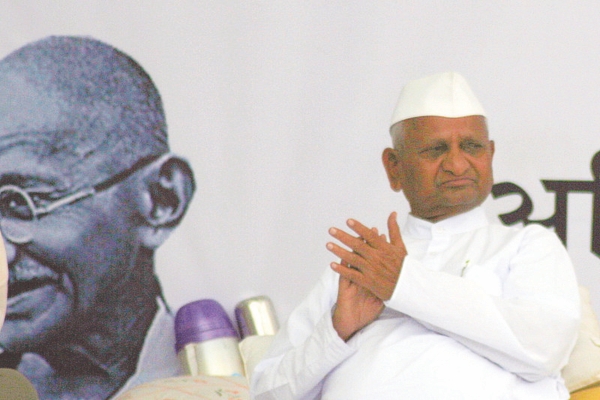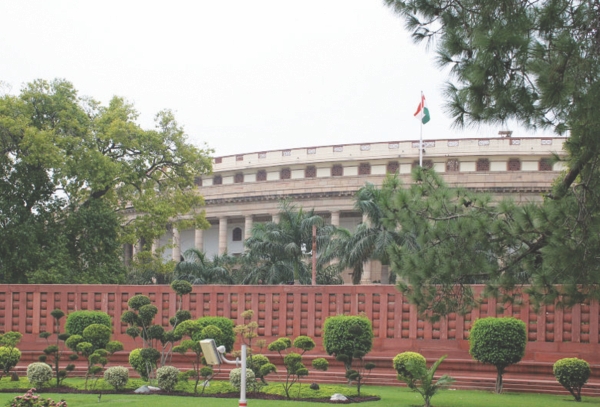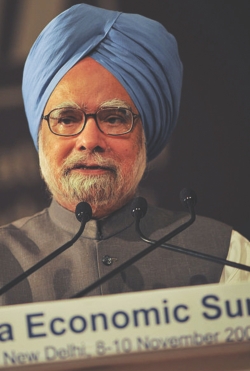| Home - Back Issues - The Team - Contact Us |
 |
| Volume 11 |Issue 39| October 05, 2012 | |
|
|
Perceptions Fighting corruption in India More important than wholesale and retail corruption is the third dimension of corruption moral corruption that has to be checked. Corruption can only be stopped if we are ready to suffer by not giving bribes. Indian citizens have to go through that painful phase. Zafar Anjum In school we were taught that constant vigilance is the true price of democracy. For decades, we did not take this principle seriously. We allowed politicians, bureaucrats, and power brokers swindle billions of rupees from the public system decade after decade. We made a few noises from time to time and then we hurtled along the path of democracy with our heads bowed. We had a nation to build. Life was not easy anyway. The result of this half-century long lapse is today's anti-corruption crusade by Gandhian activist, Anna Hazare and his team. Corruption in India has reached its tipping point. People can't take it any more. Anna has been fasting for the introduction of the Jan Lokpal bill in parliament for 11 days now. Negotiations with the government have been blowing hot and cold. Both team Anna and the ruling Congress Party have stonewalled themselves. Everybody is looking for a closure. A 74-year old frail Anna's life is at stake.
There is doubt if the government will concede to all of Anna's demands. Even if it does, will it solve the widespread corruption in India? That is the question I want to raise. Anna's demand for the appointment of a Lokpal at the Centre, a new agency empowered to fight corruption among public servants, with sweeping powers over all government officials, the prime minister included, will create a bureaucratic monstrosity. Anna also wants to appoint Lokayuktas at the state level, with bureaucratic machinery to support them. First, people who will be appointed in this bureaucratic set-up will again come from the same society that produces the corrupt police and administrative officers, politicians and clerks. How different will their morals be from their current counterparts? Second, even if they turn out to be honest, they will have to handle billions of complaints from 1.2 billion Indians. To sort out the complaints, they will have to work with other government bodies which are supposedly staffed with corrupt officials. How is this system going to work then? Corruption happens because of two main reasons: one, absence of a stringent rule of law, and two, moral weakness in individuals (instances of corruption can arise from both greed and for need of money). A nation that has people with a strong moral fibre will not tinker with the institutions in place. That's what India's basic problem is today. No one is arguing that corrupt government servants should be spared a harsh crackdown. But crackdown alone will not solve the problem of corruption. In China too, there is visibly harsh punishment for corruption, yet cases of corruption keep getting unearthed. Therefore, alongside the struggle for Lokpal, Anna should focus his energies on building a mass movement to develop people with character. This suggestion might sound a bit moralistic but if you think of it, why is it that India is in such a state today despite having all the institutions in place? The chalta hai attitude, the jugaad culture, the bribes for chai and paan has totally eaten into India's moral fibre. Anna's honesty, fearlessness and fighting spirit is an exception in today's India. People might wear 'I am Anna' caps but are they, really?
Middle class morality Manmohan Singh's economic reforms were justified by invoking the trickle down theory. The theory was a Trojan horse to implant neo-liberalism. Today, the same theory is known as voodoo economics. Among the many things, India's liberalisation has also created Indians with oversized ambitions and the gap between the haves and have-nots has only widened. Capitalism and neoliberal values have unleashed a fountain of aspirations in India. People will do anything to get by and get hold of shiny, material objects advertised on TV. The result is greed and moral decadence. No one wants to cut his coat according to his cloth. No one wants to live within his means, according to his station in life defined by his wage and profession. There is a rush to be seen with wealth, no matter how ill-gotten. We are all in it
Former Infosys CEO, Nandan Nilekani, now chairman of the newly minted Unique Identification Authority of India (UIDAI), has interesting terms to describe corruption in India: wholesale corruption (like the Commonwealth Games scam, the telecom scam) and retail corruption (corruption that occurs at the points of citizen-government official interaction). Wholesale corruption can be checked by strong institutions that are already in place. If the Lokpal becomes a reality, it can certainly focus on weeding out wholesale corruption in India. More difficult to tackle is retail corruption. There are 2.4 million government officials in India. How is one going to keep an eye on their activities? According to Nilekani, e-governance, transparent systems, and enabling electronic instruments such as Aadhaar (unique identity project that can help check corruption in the public distribution system) can help reduce retail corruption. More important than these two, however, is the third dimension of corruptionmoral corruptionthat has to be checked. Corruption can only be stopped if we are ready to suffer by not giving bribes. Indian citizens have to go through that painful phase. And now that Anna has awakened the nation, there is no one better to do this job. That should be his next mission. Zafar Anjum is the online editor of MIS Asia, CIO Asia, Computerworld Singapore and Computerworld Malaysia. |
||||
Copyright
(R) thedailystar.net 2012 |


